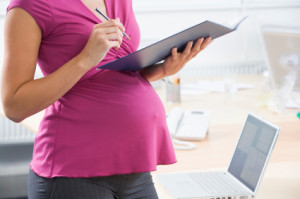
Pregnancy comes with a lot of questions: Will I have morning sickness? What should we name the baby? How big will I get? Will I get cankles? How will my pregnancy affect my job? How will my job affect my pregnancy? Can I still work when pregnant?
While not all of those questions have easy answers, a few experts share their tips for working pregnant women. Dr. Michele Whitt, OB/gyn for South Bend Clinic; Kristin Vincent, certified nurse-midwife at Saint Joseph OBGYN and Midwifery; and Donna Stiver, manager of Special Beginnings Maternity Center at Elkhart General Hospital share advice for women who are working, while pregnant.
Listen to your body.
For starters, Kristin was quick to point out that, “Pregnancy is a healthy state.” In other words, it’s not an illness and shouldn’t be treated as such. Though that does also mean you don’t receive a get-out-of-work free pass when the pregnancy test shows positive.
Kristin advises her patients to stop and listen to how they are feeling and not over stress their bodies physically or mentally. “People work in all different aspects and types of jobs. Regardless of what you do, it’s the same advice for any pregnant lady: you have to listen to your body.”
Rest up.
With deadlines, long hours and impossible co-workers, work can be stressful, making a pregnant woman wonder how that stress might affect her baby. “For most women, the stress you incur as a professional won’t have a major impact on your pregnancy,” said Michele. “I don’t tell ladies they need to cut back hours. I don’t think that’s true. The main thing is to make sure you are getting enough sleep and eating well. You can still keep the pace, but you need to be aware of your body and what’s going. At times when you are more tired, you need to take more frequent breaks and down time. I see frustration among pregnant professionals when they get tired and can’t go go go like before.”
Support your back.
Michele said one complaint she most often hears from women in her practice is back pain. To help alleviate that, she advises her patients to elevate their feet when sitting down or to wear a back support. “In the first trimester, you are sick. The second trimester is the honeymoon. The third is when you feel the weight and pressure. With the additional weight in front, you tend to arch your back,” Michele said. “Finding good support can help put your spine in a more neutral position. Pregnancy belts can help support your back when that happens.”
Move around.
Aches and pains sometimes come along with pregnancy. To help ward those off, Kristin suggests getting up from your desk and moving around every hour. “Usually you have to pee anyway, so you might as well get up and go for a walk.”
Doing so improves circulations and moves water through your legs to help ward off that dreaded swelling in your feet and ankles which leads to cankles. “Especially in the third trimester, edema is worse and made worse when your legs are hanging down.”
Moving around can have another added benefit: better baby positioning. Kristin said, “At the end of the day, a lot of times women will want to sit down in a recliner and just kick back, but doing that can turn the baby the wrong way.”
Exercise.
“Exercise in general is good for your overall health. Anything that is good for your overall health is good for your pregnancy,” Michele said. She recommends moderate exercise to help make pregnancy a bit more comfortable. “If you aren’t otherwise physically fit, aches and pains can be worse.”
Kristin agreed. “Labor is like a marathon. If you sit and don’t do anything and eat for two, it’s not going to be pretty. It can mean longer labor, longer recovery and you’re more likely to experience post-partum depression.” If that isn’t enough of a reason to exercise, while pregnant, Kristin included this reminder and motivator to start training now, “Remember, the average first labor is 15 hours, so imagine you will be working out for 15 hours.”
As Donna pointed out, new exercises for pregnant women can be challenging. “Your sense of balance can be off and your center of gravity can change. Be sure to talk with physician first to see what exercises are okay to do during pregnancy.”
Kristin and Michele both recommend starting slow. Walking and yoga are both great options for women who haven’t been too active before pregnancy. “Don’t start off with high-impact exercises,” said Michele. “It is hard on your joints and you don’t want to be achy and sore because you don’t want to take Motrin, aspirin or the like for the pain. Start slow with no more than 30 minutes a day.”
Kristin said most women can continue with the exercises they did before becoming pregnant. “If you are a runner you can keep running. I had one patient who ran eight miles a day when she was nine months pregnant because her body was conditioned to do so already.”
Don’t forget the Kegels.
While you can’t always do downward facing dog at your desk, Donna shared one exercise that you can do, while at the office. And no one will even know. What is it? Kegels.
“During pregnancy and after delivery, the pelvic floor, uterus, bladder and bowels can get laxed and stretched,” Donna said. “So the goal would be to help strengthen the pelvic floor and help strengthen the muscles that support it. We recommend doing Kegels as a way to keep those muscles strengthened and stronger later in life.”
As you work for two, remember to listen to your body, try to stay comfortable and do your exercises. As Kristin said, you’ve got a marathon ahead of you. So start training now.
This article first appeared in Sassy Magazine.






